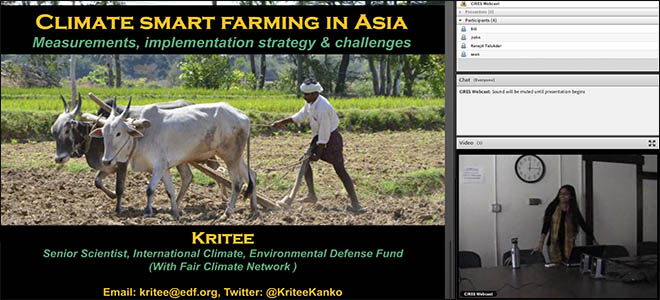Climate Smart Agriculture in Asia: Measurements, Implementation Strategy and Challenges
by Kritee Kritee
Senior Scientist, International Climate, Environmental Defense Fund
Abstract: To feed a world of 9 billion people in 2050, it is vital to work with farmers in the developing world because many farms in developed countries have already reached what are currently maximum possible yields. A vast majority of farmers in developing countries own small-scale farms (< 2 acres in size) and are on the frontline of experiencing worsening impacts of climate change (e.g., increasing droughts, floods, seawater intrusion and heat waves). It is also crucial to note that protecting forests, increasing carbon content of the soils, water and N use efficiency can decrease global emissions by as much as 13 gigatons CO2eq/year by 2030 – more than a quarter of current annual global emissions. Local, regional and international organizations must, therefore, help farmers access the knowledge and tools they need both to be resilient to climate change and to help mitigate it. This talk will discuss greenhouse gas emission measurements and culturally-sensitive implementation strategies Environmental Defense fund is engaged in five states in India to 1) promote evidence-based locally appropriate climate-smart agricultural practices, and 2) improve farmer’s access to finance to improve the adoption rate of these practices.
Biography: Kritee is a part of Environmental Defense Fund’s international climate team that is linking farmers to the carbon market in ways that promote mitigation, support development in the rural economy, accelerate poverty alleviation, and strengthen adaptation to the effects of climate change. She is helping lay the groundwork for agricultural carbon offset protocols for small land holdings by directing a multi-partner research team at the five GHG (nitrous oxide and methane) measurements laboratories across three states in Southern India. This research team is examining the effectiveness of innovative farming practices in delivering the three-fold goal of increased crop yields, better farm economics and decreased GHG emissions. She also provides scientific input to EDF’s domestic legal teams’ efforts to improve government policies related to the energy sector, with a focus on mercury pollution from electric generation units.


